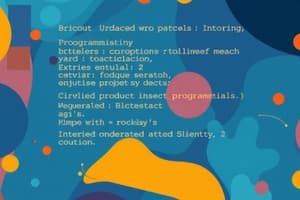Podcast
Questions and Answers
What is the purpose of object-oriented programming (OOP)?
What is the purpose of object-oriented programming (OOP)?
- To develop large-scale software and GUIs effectively (correct)
- To create templates for structuring and creating objects
- To organize programs as a collection of objects
- To enable efficient programming using objects
What are the fundamental components of OOP in Java?
What are the fundamental components of OOP in Java?
- Data and Storage
- Variables and Methods
- Classes and Objects (correct)
- Attributes and Templates
What is a class in OOP?
What is a class in OOP?
- A method of implementing programs using objects
- A template for structuring and creating objects with the same attributes and methods (correct)
- A block of code inside a class which only runs when it is called
- A collection of objects with cooperative behavior
What is the difference between Variables of Primitive Types and Reference Types in OOP?
What is the difference between Variables of Primitive Types and Reference Types in OOP?
What are the attributes of a class in OOP?
What are the attributes of a class in OOP?
What is the purpose of setter() and getter() method in Object-Oriented Programming?
What is the purpose of setter() and getter() method in Object-Oriented Programming?
How are reference variables and reference types used in Object-Oriented Programming?
How are reference variables and reference types used in Object-Oriented Programming?
What is the significance of creating an object from a different class in Object-Oriented Programming?
What is the significance of creating an object from a different class in Object-Oriented Programming?
How are static variables, constants, and methods utilized in Object-Oriented Programming?
How are static variables, constants, and methods utilized in Object-Oriented Programming?
What is the primary function of an object in Object-Oriented Programming?
What is the primary function of an object in Object-Oriented Programming?
What is the template for structuring and creating objects with the same attributes and methods in Object-Oriented Programming?
What is the template for structuring and creating objects with the same attributes and methods in Object-Oriented Programming?
Which of the following best represents the data stored inside a class in Object-Oriented Programming?
Which of the following best represents the data stored inside a class in Object-Oriented Programming?
In Object-Oriented Programming, what is the primary purpose of the getter() method?
In Object-Oriented Programming, what is the primary purpose of the getter() method?
What is the fundamental difference between variables of primitive types and reference types in Object-Oriented Programming?
What is the fundamental difference between variables of primitive types and reference types in Object-Oriented Programming?
In Object-Oriented Programming, what is the purpose of static variables and methods?
In Object-Oriented Programming, what is the purpose of static variables and methods?
Flashcards are hidden until you start studying
Study Notes
Object-Oriented Programming (OOP) Basics
- The purpose of OOP is to organize and structure code in a way that simulates real-world objects and systems.
Classes and Objects
- A class in OOP is a blueprint or template for creating objects.
- Classes define the properties and behaviors of objects.
- An object is an instance of a class, with its own set of attributes and methods.
Variables and Data Types
- Variables of Primitive Types store actual values.
- Variables of Reference Types store memory addresses or references to objects.
Class Attributes and Methods
- Attributes of a class are the data members that define the characteristics of an object.
- Setter() and getter() methods are used to modify and access the attributes of an object, respectively.
Object Creation and Reference
- Creating an object from a different class allows for code reuse and modularity.
- Reference variables and reference types are used to store and manipulate objects in OOP.
Static Members
- Static variables and constants are shared by all objects of a class.
- Static methods are used to perform operations that are not specific to any object.
Objects and Their Functions
- The primary function of an object is to represent and encapsulate data and behavior.
- Objects are created from a class template, which defines their attributes and methods.
Class Template
- A class template is used to structure and create objects with the same attributes and methods.
Data Storage
- The data stored inside a class is represented by its attributes or data members.
Getter() Method
- The primary purpose of the getter() method is to retrieve or access the values of an object's attributes.
Primitive vs. Reference Types
- The fundamental difference between variables of primitive types and reference types is in how they store and manage data.
Static Members
- The purpose of static variables and methods is to provide a shared resource for all objects of a class.
Studying That Suits You
Use AI to generate personalized quizzes and flashcards to suit your learning preferences.




